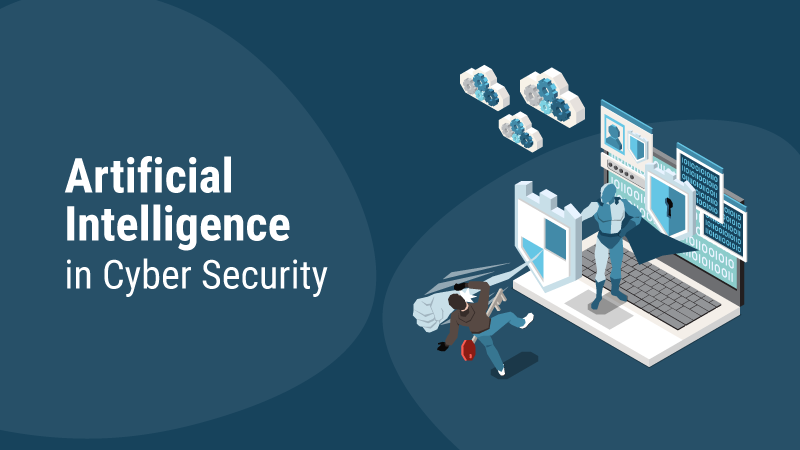Artificial Intelligence in Cyber Security

Conventional security measures in the cyber world depend on antivirus programming such as firewalls. There are many tools to identify and prevent security vulnerabilities in cyberspace. Even with the advancement of technology, cybercrime continues to grow and become more complex every day. Cybercriminals carry out innovative attacks that endanger modern security systems. Companies opt for Artificial Intelligence (AI) to improve the capability of their system to identify vulnerabilities and cope with rising cyber-attacks. Artificial intelligence in cyber security helps companies not only to protect their defense systems but also to help them in analyzing crimes. Meanwhile, AI utilizes machine learning (ML), deep learning, natural language processing (NLP), etc. in order to make it difficult for cybercriminals to access servers, as well as other relevant data stored inside the system.
Impact of Artificial Intelligence on Cyber Security
The application of artificial intelligence has a great impact on cyberspace, especially when it comes to matters that concern the security of a system or network. Other than offering aid to experts in identifying cyber threats or attacks, artificial intelligence has the following impacts:
Phishing Detection and Prevention Control
Phishing is one of the most extensively used fraudulent activities in which attackers send emails pretending to be from reputed firms in order to lure individuals and companies to obtain crucial information. One out of 99 messages are phishing messages and that makes a phishing attack a common one. Fortunately, AI-ML may have a significant role to play in preventing and diverting phishing attacks. Computer-based Machine Learning can identify and track over 10,000 dynamic phishing resources and enables us to respond to and solve them faster than people can. In addition, AI-ML works in coordination to percolate phishing attacks from around the world. AI has also made it possible to distinguish between a fake site and a real site quickly.
Secure Authentication
Passwords are always extraordinarily sensitive when it comes to security. In fact, they are borderline between cyber attackers and our data/records. AI uses various components to recognize an individual using physically identifiable biometrics like facial features, fingerprint, and voice recognition that acts as the primary means of safe and secure verification. For instance, a cell phone verifies the unique finger impression and facial features to allow you to sign in. This process consists of a program that checks basic information, focusing on your face and fingers to identify if a login is valid. In addition, AI can look for various other elements to determine if any client is authorized to sign in to any specific device. The technology analyzes factors such as your voice, how you enter keys, typing error rate, and composing speed.
Quick Detection and Response Time
Artificial intelligence can cross-reference cautions and security information sources instantaneously in order to speed up the detection of authentic issues. This even helps the experts in digital security to approach each security issue that needs to be taken care of. Anyhow, it has the backing of AI frameworks that continuously suggest plans to improve responses.
Better Endpoint Protection
With the increase in the number of remotely operating devices, AI plays a major role in protecting all endpoints. Though malware and ransomware attacks can be prevented using antivirus solutions and VPNs, they operate on the basis of signatures. This indicates that signature definitions need to be updated in order to remain safe from newly emerging threats. If a new type of malware attack occurs, antivirus solutions and VPNs may not be able to protect against it. But in the case of AI-driven endpoint protection, if something unusual happens, the AI points it out and takes necessary action by either notifying the technician or returning it to a secure condition after a ransomware attack. Instead of waiting for signature updates, it gives active protection against threats.
No Zero-day Vulnerabilities
Any new threat a security expert has to deal with and does not have a patch or remedy to fix is considered a zero-day vulnerability. Zero-Day indicates that the experts have zero days to solve the problem, and an attacker may have already taken advantage of them. Mostly these threats are seen in IoT devices that are not secured. AI’s machine learning algorithms analyze inaccuracies in network traffic, detect zero-day threats and eliminate security vulnerabilities and prevent patch exploitation.
Automating Security Tasks
Machine Learning (ML) and Robotic Process Automation (RPA) play an important role in reducing monotonous and time-consuming security tasks, which in turn help human workers to focus more on other relevant tasks that require human attention intelligence. AI algorithms monitor the functioning of the system throughout and are capable of identifying malicious activities or threats like ransomware. Once the threat is identified, it destroys the threat and prevents it before it starts attacking the system. Machine learning can also be used to automate repetitive tasks such as checking network traffic, eliminating viruses, and analyzing network logs.
Behavioral Analytics
One of the important uses of AI in the cyber security department is its capability and efficiency in analyzing behavioral patterns. This indicates that ML calculations can study and exemplify human behavior by distinguishing the way humans use gadgets and online platforms. AI calculations watch any kind of unusual activities or any conduct that is different from your standard examples. It can identify it as performed by a suspicious client. AI calculations can perform various exercises ranging from huge online buys transported to addresses different from yours, an abrupt spike in report downloads from your documented envelopes, or an unforeseen variation in your composing speed.
Preventing Online Frauds
Organizations should have the option to detect a digital attack in advance. This is an option to thwart what the enemy is trying to do. Artificial Intelligence has proven to be of amazing value in identifying cyber-attacks and identifying risks before the threats take advantage of the vulnerabilities in your data frameworks. When it comes to fraud prevention AI redefines itself by taking past experience into account and in light of new behaviors, and trends in transaction irregularities. AI provides fraud analysts with real-time risk scores and more information about threshold score settings to increase sales and reduce fraud losses.
Wrap up
The application of Artificial Intelligence (AI) in cyber security will emerge as the basic mechanism for developing and controlling security systems. Cyber security professionals will get more response time to combat these malicious attacks because AI can detect many threats before they create damage. AI can also detect cyber security vulnerabilities and give recommendations to specialists in order to take appropriate action.
Read more about AI
- Artificial Intelligence in E-commerce
- 7 Real-World Applications of Deep Learning
- Artificial Intelligence in Marketing
- Artificial Intelligence in Finance
- Artificial Intelligence in Banking
- Artificial Intelligence in Everyday Life
- Artificial Intelligence in Insurance
- Artificial Intelligence in Transportation
- Artificial Intelligence in Fintech
- Artificial Intelligence in Logistics
- Artificial Intelligence in Manufacturing
Blogs by Category
AppForms Artificial Intelligence Blockchain Call Centers Chatbots Cloud Computing Data Management Design Digital Marketing Digital Transformation Enterprise Applications FinTech Insights LowCode Development Microsoft Mobile Apps News Office 365 Robotic Process Automation Security SharePoint Software Development Web ApplicationArtificial Intelligence in Retail

2024-04-04 18:27:34